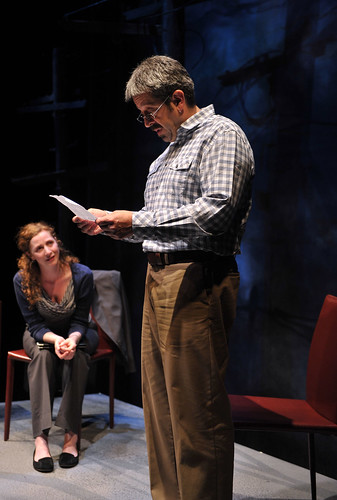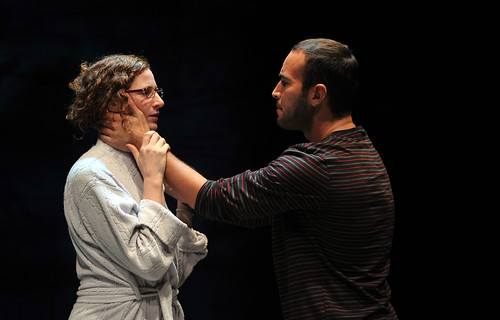Rolf Saxon is Ben Joseph and Jessica Bates is Emma Joseph in Aurora Theatre Company’s production of After the Revolution by Amy Herzog and directed by Joy Carlin. Below: Bates’ Emma is comforted by Adrian Anchondo’s Miguel. Photos by David Allen
Berkeley’s Aurora Theatre Company opens its 22nd season with Amy Herzog’s smart, moving drama After the Revolution, an ambitious play that juggles American history, the cost of political idealism and how one generation affects another – for good and ill – in a tight-knit family.
This is the same Herzog whose 4000 Miles was so good at American Conservatory Theater earlier this year (read my review here), and this play, which predates 4000 Miles, also features the character of Vera Joseph (who is based on Herzog’s own grandmother). Vera is the widow of Joe Joseph, a member of the Communist party and a blacklisted victim of the McCarthy witch hunts in the 1950s, and though she’s younger in this play (by about a decade), she’s just as irascible – a crusty, Leftie granny with lots of bite left in her.
But Vera isn’t the focus here. The spotlight belongs to Vera’s granddaughter, Emma Joseph (Jessica Bates), a brilliant, recently graduated lawyer who runs the Joe Joseph Fund, a nonprofit aiming to release Mumia Abu-Jamal, the former Black Panther who was given the death sentence for the murder of a Philadelphia policeman. The year is 1999 (before Mumia’s sentence was commuted to life in prison), and Emma and her group feel that Mumia, because of his outspoken political views and the fact that he’s black, led to a farce of a trial and an overly harsh, even racist sentence. In other words, Emma feels she is carrying on her grandfather’s legacy by not giving in to governmental abuse of power.
Emma is the pride and joy of her family. Her dad, Ben (Rolf Saxon) can barely contain the tears when he toasts his daughter, who is so proudly carrying the banner for the family’s history and politics. Ben’s brother, Leo (Victor Talmadge) is equally proud and somewhat chagrined that his own three children, whom he calls “jocks,” don’t care at all about politics, blacklists or Communists. And then there’s Vera (Ellen Ratner), who is disappointed that all of her grandchildren, except Emma, have so little political intelligence or ambition.
When a deep, dark secret from decades past emerges, as such secrets often do, the Joseph family splinters. Emma suffers the most from the news, and everyone is left to deal with her implosion. It seems Joe wasn’t exactly the stand-up-and-fight-the-power Commie Emma thought he was. He was the “share government secrets with the Soviets during World War II” kind of Commie, and to Emma, that is dishonest and dishonorable. Vera sees it differently, that Joe was working for Stalin, in whom he believed more than Roosevelt, and it was before we knew everything we later knew about what Stalin was actually doing in Russia.
Whatever, this revelation makes Emma question everything about her choices in life, especially the work she’s doing in her grandfather’s name. The revelation also threatens to destroy Emma’s relationship with her father, whom she revered as an inspiring Marxist public school teacher. Not a liar who kept vital information from her and arguably let her take money from donors to the Fund under somewhat false pretenses.
When it comes right down it, After the Revolution is really a father-daughter drama, and a bracingly good one. As Emma retreats from the world and wallows in self-pity and seems incapable of showing any shred of compassion for anyone (especially her father), Ben keeps trying to reach out to her and heal their rupture. The scene when they finally do meet, each prepared as if for a lecture demonstration, is alive with humor, regret, deep sadness and even deeper love. It’s a marvelous scene, beautifully played by Bates and Saxon. We never doubt Ben’s love for his daughter or his torment over not sharing the truth about his father sooner. But the scene allows Bates’ Emma to show that she has grown and expanded as a human, that she is capable of compassion.
Perhaps because that scene is so emotionally rich and rewarding, it’s disappointing, then, that the play shifts attention away from Emma, who is the protagonist, and to Vera, who is but a key supporting player. Vera makes an important point about Emma’s choices as they relate to her grandfather, but the play suffers from the shift in focus.
Director Joy Carlin navigates these tricky dramatic waters with aplomb and sensitivity. Politics are important here, but they never overtake the emotional lives and connections of the characters. The excellent supporting cast includes Adrian Anchondo as Emma’s boyfriend, who also works at the Fund; Pamela Gaye Walker as Ben’s wife (who has one of the play’s best scenes in a late-night phone call to a suffering Emma); Peter Kybart as a wise (and loaded) donor to Emma’s Fund; and Sarah Mitchell as Emma’s sister, who is fresh from another round of rehab.
Herzog creates a broad canvas here that allows money, history, truth and family to ratchet up the stakes and provide the ultimate reward. After the Revolution
isn’t exactly revolutionary, but as a family drama it surges with power and heart.
[bonus interview]
I talked to After the Revolution director Joy Carlin for a story in the San Francisco Chronicle. Read the feature here.
FOR MORE INFORMATION
Amy Herzog’s After the Revolution continues an extended run through Oct. 6 at Aurora Theatre Company, 2081 Addison St., San Francisco. Tickets are $32-$50. Call 510-843-4822 or visit www.auroratheatre.org.




